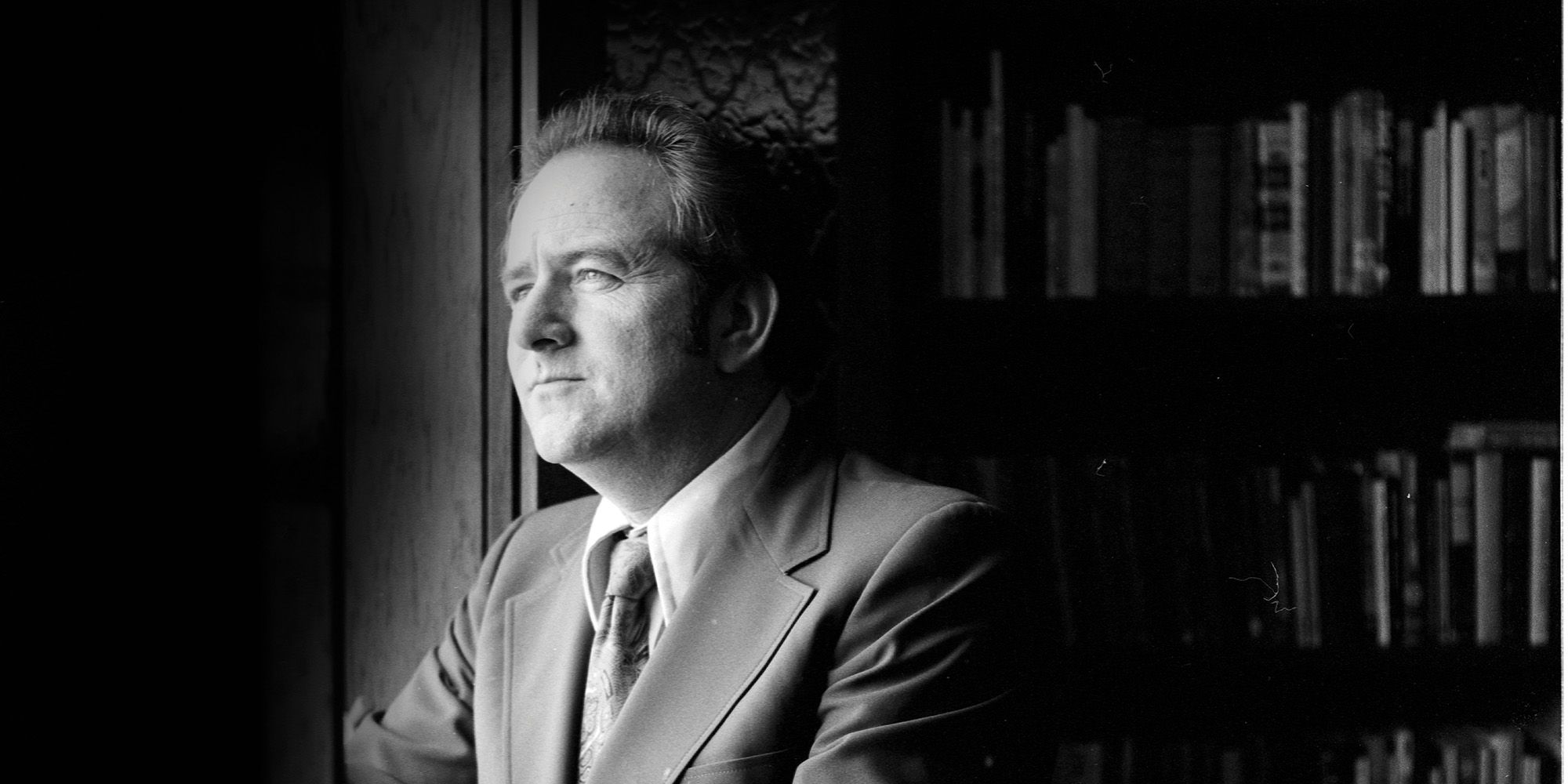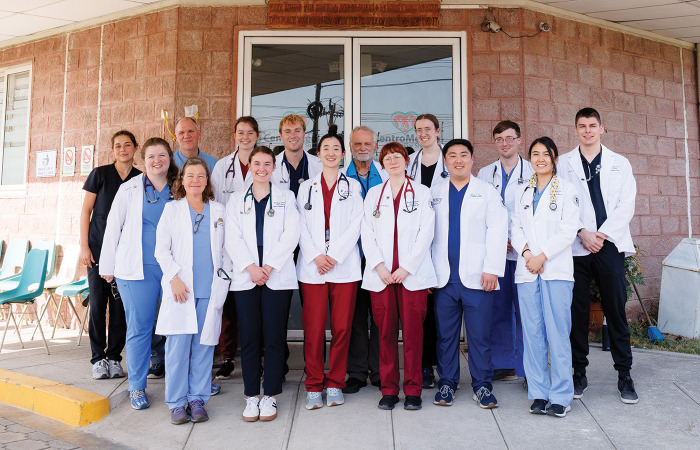The Rev. Jerry Falwell formed Thomas Road Baptist Church in Lynchburg, Va., in 1956. In January 1971, he asked his congregation to catch his vision of training future leaders who would leave undeniable marks on the world. A new college, he said, would be built for “thousands of young men and women, deeply in love with the Lord Jesus Christ, who will go out in all walks of life to shake this world for God.” The first classes were held that fall.
A national figure featured on television and the covers of Newsweek and Time magazines for defending conservative Christian values in the public sphere, Falwell still remained a passionate preacher and Christian educator throughout his life. He imparted spiritual wisdom and encouragement through his sermons and writings. He is the author of 15 books. Falwell passed away on May 15, 2007, at the age of 73.
The words of this bold visionary are still poignant today as Liberty celebrates 50 Years of Training Champions for Christ. Below, read in Falwell’s own words how a strong faith is essential to the Christian life — the same strong faith that built Liberty University.
“Faith to Move Mountains”
By Jerry Falwell, Founder of Liberty University
Note: This column is an excerpt from “Stepping Out on Faith,” co-authored by Dr. Elmer Towns (1984, Tyndale House Publishers)
I accepted Christ as my Savior in January 1952. The Bible describes this as: “For by grace are ye saved through faith” (Ephesians 2:8). To me, faith was simply putting my trust in Jesus Christ to save me from sin. My faith became effective by its object, Jesus Christ. That initial act of faith molded my whole perspective of living for Christ and serving Christ. I learned that I not only had to be saved by faith, but live by faith and serve by faith.
When I went to Baptist Bible College in Springfield, Missouri, I encountered people who were trusting God for every aspect of their lives. They were living by faith, and I wanted to have the same type of walk with God. These people were trusting God to take care of their financial needs. My parents were not wealthy, but they were comfortable. I had been given $4,000 before I went off to school. I knew the promises in Scripture that God would take care of me. I wanted to put God to the test when he said, “Prove me now” (Malachi 3:10). As an act of faith, I gave away the $4,000 to needy individuals, the school, and the church.
During these early formative days of my Christian life, I asked the dean of students for a key to an empty dormitory room. Each afternoon after lunch, I went there and began praying for God’s blessing on my life. I read books by such great men as R.A. Torrey, Hudson Taylor, Watchman Nee, and others who lived by faith. These books, plus the messages I heard at college, challenged me to trust God for everything. I had a new Buick that my mother had given me. I needed gas to use it in Sunday School visitation, so May Hawkins provided me a Texaco account so I could fill it up whenever necessary. God used others to meet my needs. It seemed every time a godly Christian businessman passed me at church, he put a $20 bill in my hand.
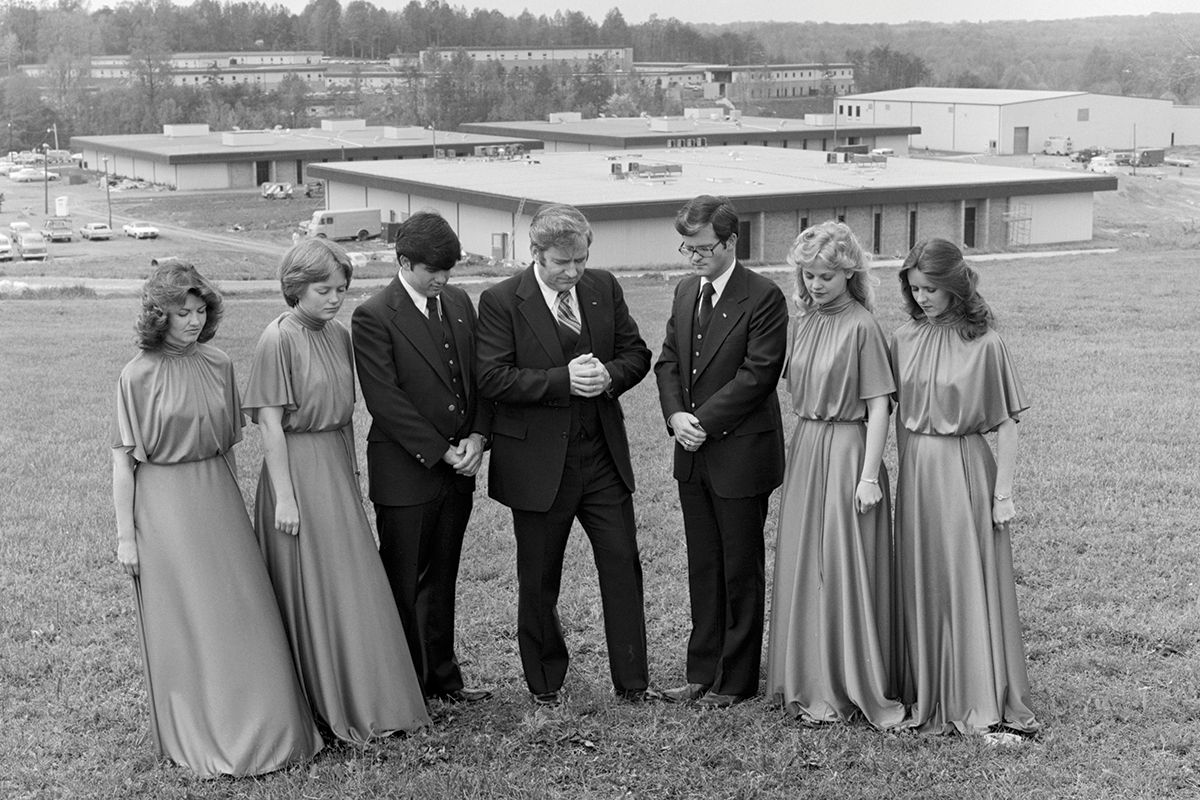
Jerry Falwell Sr. prays with a campus singing group in April 1979.
When I returned to Lynchburg to begin Thomas Road Baptist Church, I became aggressive in trying to win souls and reaching the city for Jesus Christ. I was going door to door, trying to win people to Christ. To reach the entire city by the most efficient means possible, I immediately began a daily radio program. When I realized that people were watching TV, I prayed that God would open the door to television. When the opportunity came, I knew God would supply the finances because we were carrying out the Great Commission.
Perhaps some have tried to raise money for a radio or television ministry and failed, not because God did not hear their prayers, but perhaps because their motives were not singularly dedicated to carrying out the purpose of God to win souls and edify Christians.
When we faced our first anniversary at Thomas Road Baptist Church, we wanted to demonstrate the power of God to Lynchburg. Every Sunday before the evening service, I met with several men, including Emmitt Godsey, to pray for God’s blessing. We met in a small room with a dirt floor. It was there that God burdened us to set a goal of 500 people for our first anniversary.
I realize that some critics have misunderstood why we set goals, but I believe faith moves mountains and glorifies God. Faith is not only an instrument; it enables us to intervene in problems and overcome obstacles. The church had 864 on its first anniversary. That victory reinforced my faith to trust God for bigger goals. Paul challenges us to go “from faith to faith” (Romans 1:17), which I interpret to mean going from one victory by faith to another.
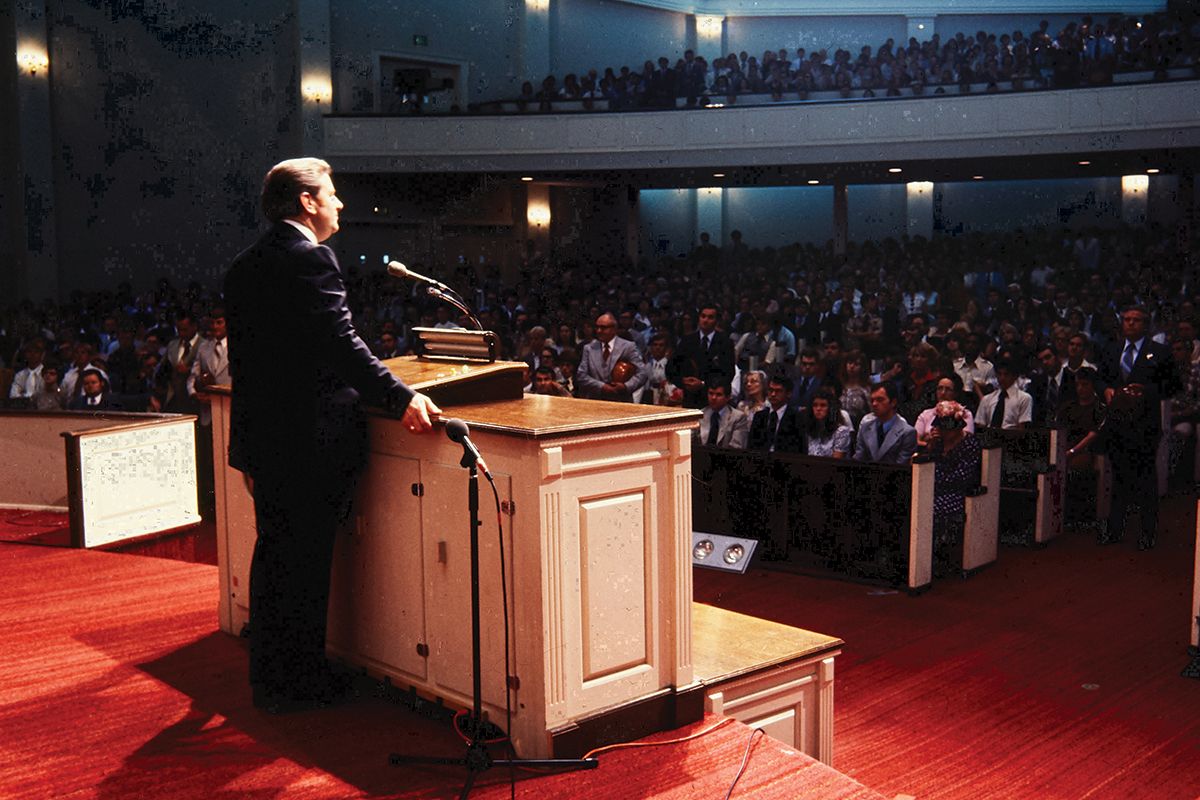 It seems we have always been setting goals and making them. A memorable goal was to have 10,000 in attendance for Harvest Day, 1971. I thought we ought to demonstrate that God could glorify himself in a small, central Virginia town by doing what everyone thought was impossible.
It seems we have always been setting goals and making them. A memorable goal was to have 10,000 in attendance for Harvest Day, 1971. I thought we ought to demonstrate that God could glorify himself in a small, central Virginia town by doing what everyone thought was impossible.
Jesus had promised, “If ye have faith as a grain of mustard seed, ye shall say unto this mountain, ‘Remove hence to yonder place;’ and it shall remove; and nothing shall be impossible unto you” (Matthew 17:20). Based on the Word of God, I knew we could reach 10,000. I knew that if soul-winning was our aim, God would have to bless us. But I also knew faith and works go hand in hand (James 2). We organized and worked, saturating Lynchburg by every conceivable means. We had 10,187 in attendance with 157 decisions at the altar.
Quite often I get letters from people questioning why we have so many financial crises at Liberty or the Old Time Gospel Hour. I do not feel we should let up or turn back. We have the command of God to go into all the world and win people to Christ. With that staggering command, we have the promise that God will supply our every need.
As I write this chapter, I have challenged our people to pray for $10 million (June 1983). We have continued to build new buildings on Liberty Mountain for the college, and we have continued to broadcast the Gospel on over 500 radio and 300 television stations. Since we have done what God has commanded, I expect God to provide $10 million to take care of the bills.
A newspaper reporter asked me, “Suppose the money does not come in; what will happen?”
“We do not think that way,” I told her.
“Just suppose,” the reporter again asked.
“I am not even willing to do that,” I replied.
Since God has promised to meet our needs, why should I doubt His integrity by even considering less than
His promise?
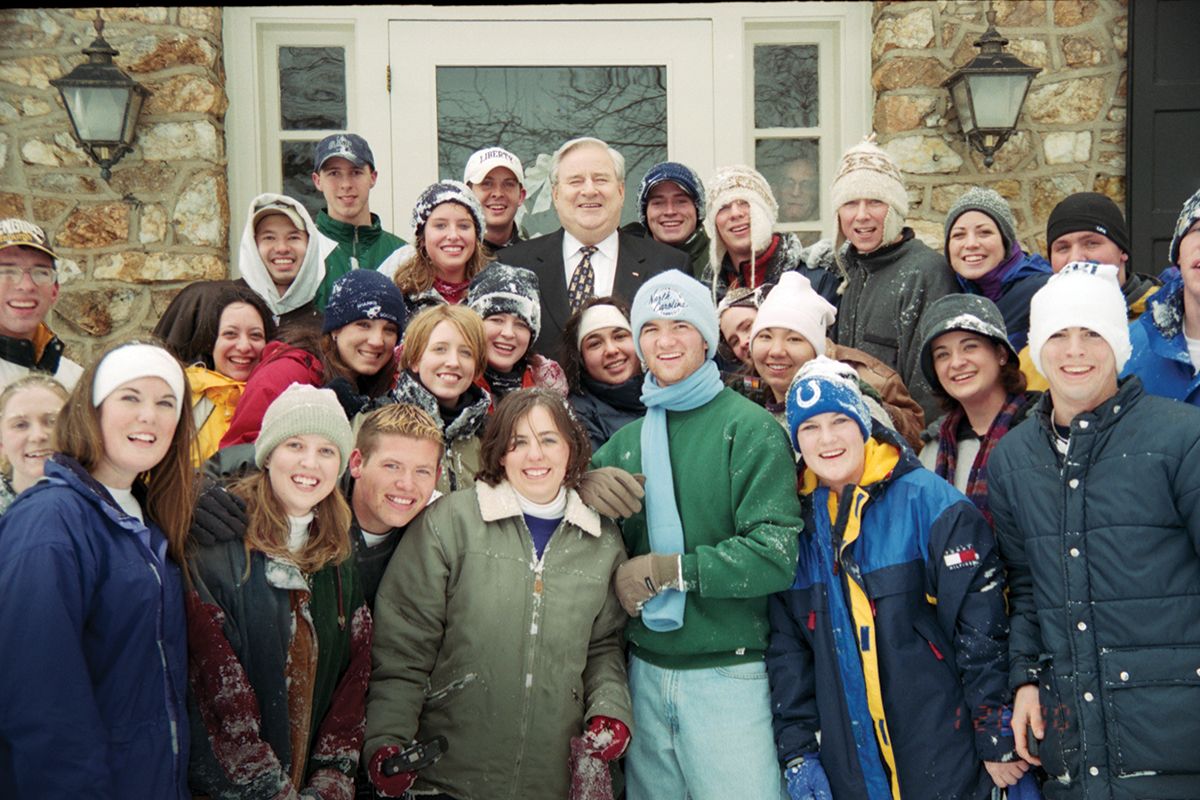
Students enjoy a snow day with Jerry Falwell Sr. in January 2000.
I have never tried to give a complete systematic explanation of faith to the ministry students at Liberty. I believe in what has been called the “hot poker” method of communicating faith. Just as the poker is heated in the fire, I believe these young ministers learn to have faith in God as they trust God with us for the buildings in which they study and the sidewalks on which they walk. They learn faith by exercising faith.
I tell the young ministers at Liberty to “go and do it better and do it bigger.” If a ministerial candidate accepts this challenge, his faith is stretched. He realizes he cannot begin a church by human means because it is not easy to plant a church. When a young man commits himself to plant a church, it is a “step of faith” in which he must overcome obstacles. With this challenge, the young man realizes he must grow in faith, overcoming the weakness of his faith. If these men accept the challenge to build a church, they also realize their weak faith; hence, they are placed in a crisis in which they must trust the power of God. As they exercise the first step of faith, if they are successful, they will grow in their ability to trust God for bigger projects.
The term “saturation evangelism” applies to the principle of completely covering a town with the Gospel, just as a man uses a lawn sprinkler to saturate the ground so the grass will grow. If a young man will saturate his Jerusalem with the Gospel by using visitation, posters, mailings, radio, television, billboards, etc., he will successfully build a church. He does not express faith by just praying for lost people to get saved; rather, faith is expressed by first praying, then aggressively going to as many people as possible and presenting the Gospel to them. Faith is not passively waiting for people to come to your church; faith is actively going to the lost.
The term “super-aggressive evangelism” is another way of saying saturation evangelism. The phrase “super-aggressive” means to use all our energy and creative ability to get the Gospel to people in a positive way so they will be saved. Super-aggressive refers to the enthusiasm and zeal with which the task is done. The key to understanding super-aggressive evangelism is to possess or be possessed by a vision of what God can do. The following verse explains the basis of saturation evangelism: “Ye have filled Jerusalem with your doctrine” (Acts 5:28). The purpose of a church is to fill its “Jerusalem” with the doctrine of Christ. When our Jerusalem, Lynchburg, is saturated, a person under conviction will think first of Thomas Road when he is searching for God. God is able to use saturation evangelism to lead sinners to a church where they can hear the Gospel.
The church at Jerusalem was accused of having filled Jerusalem with their doctrine (Acts 5:28). That simply means they had personally talked to every individual in Jerusalem and presented him with the claims of the Gospel. Several years later they were accused of having turned the world upside down. They did all of this without television, radio, a printing press, automobiles, airplanes, or telephones. Today, saturation evangelism is filling one’s “Jerusalem” with the Gospel.
As Liberty students become involved in Christian service in Thomas Road Baptist Church, they “catch the spirit” of church growth. Usually, they see a weekly application of growth as they serve God in the church. After graduation, most students are convinced that the principles they were taught at one of the Liberty schools will produce growth in their new church.
I do not believe we give church planters their faith; we simply provide the challenge and opportunity to grow their faith. Faith comes from the Word of God (Romans 10:17), and it grows as a young man actively applies the principles of Scriptures to his life and ministry.
COMING SOON: A new center on campus will honor Jerry Falwell’s legacy and preserve the mission of Training Champions for Christ. Read more.
|
